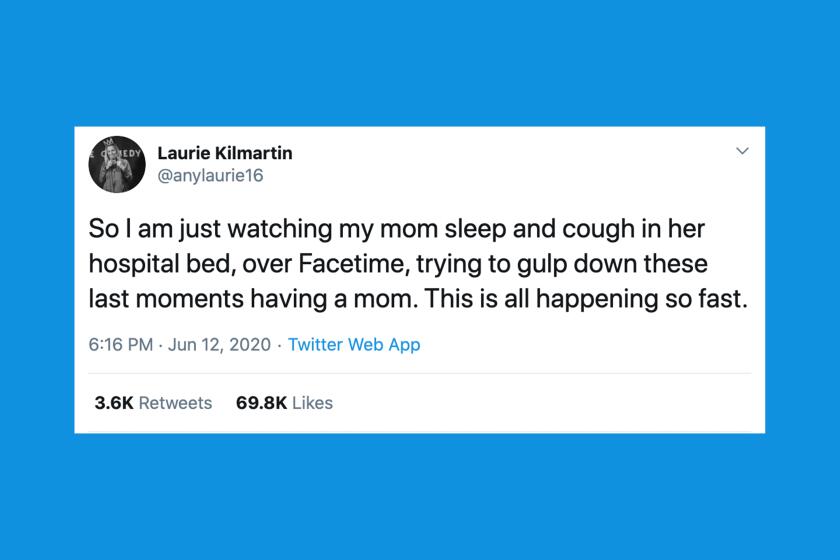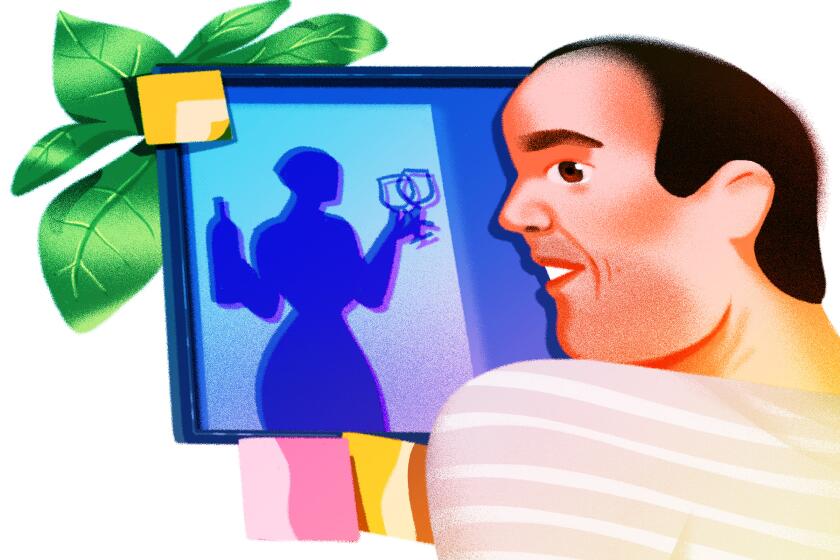My mother died in April of cancer. Coronavirus robbed us of closure

- Share via
In April, my mom passed away from uterine cancer at age 70. Like so many other deaths, it was shaped by a pandemic. My three brothers and I were not allowed to visit her in the hospital the month before she died. We could not comfort her as her cancer was rapidly spreading throughout her body and her kidneys were failing.
Months later, like so many other families who’ve lost loved ones in the time of COVID-19, we were still struggling with how to grieve her death. How could we mourn when we couldn’t gather?
I didn’t want a Zoom funeral. I wanted to honor her at a lovely celebration of life with all her favorite people on a sunny SoCal patio. I wanted stories, hugs and margaritas.
In heartbreaking and astonishing detail, comedian and writer Laurie Kilmartin used Twitter to detail the final hours of her mother’s life Thursday morning to her 85,000-plus followers. Thousands of people responded with messages of support and sympathy as they accompanied her journey through the loss.
I wanted to play her beloved Eagles and James Taylor songs and display photos of her big and full life. I imagined a table loaded with her favorite foods: Ruffles potato chips with onion dip, carne asada burritos, shrimp cocktail and rolls made from frozen Bridgford dough that we loved at every holiday.
We had hoped to schedule such a celebration later this summer to coincide with our canceled family reunion in Ireland, yet as California backtracks on reopening, it appears such large gatherings won’t be advisable any time soon.
We were in the Land of Waiting. And frankly, no one knew what to do. Should we hold a small socially distanced service? Do we keep texting “Let’s circle back in a few weeks” to relatives who asked if they should buy plane tickets? At the same time, other relatives were still posting daily photos of their quarantine cooking.
We have been married for 12 years. But in spring 2020, under quarantine, and especially in the first weeks, we began talking to each other again just like in our beginning, only in person.
We are meant to mourn with others. As the pandemic stretched on, I feared something would be lost if we kept postponing her party. Would it become less meaningful over time? Would delaying interrupt the grief process? And if we did resort to Zoom in the meantime, would people still come to the “real” celebration?
A few days after her death, a neighbor recommended that I join Los Angeles grief expert David Kessler’s online support group created in March on Facebook because people could no longer meet in traditional grief groups. So I reached out to see if he had any advice on how to navigate this new cultural terrain.
Don’t wait, he said. Delaying goes against our human nature to acknowledge such an important loss. “Death needs to be marked in real time, when the moment is most intense. There’s something important about the fact that their life ended,” said Kessler, author of “Finding Meaning: The Sixth Stage of Grief.” “Clearly, we don’t know what the future looks like and whether we have a second [COVID-19] wave, and you don’t want to not mark it.”
In Orlando Soria’s new HGTV series, interior design helps homeowners overcome difficult life transitions.
Kessler suggested doing something small now, such as a family dinner, and something bigger later. Zooming counts, but he added that people should establish guidelines to set a reverent tone. You want to avoid this scenario: The Zoom service in which one participant showed up in a sloppy tank top and another signed on while stapling papers at work.
I was also curious if there was special advice for people whose parent died of cancer during a pandemic and called Bronwen Jones, an interfaith chaplain at Cedars-Sinai Samuel Oschin Comprehensive Cancer Institute. She said visitor and traveling restrictions had robbed many families of the chance to say goodbye. “This is a disconcerting shift we’re witnessing,” she said.
I know that my family was extremely lucky. Unlike the heart-wrenching stories of families uttering last words via FaceTime, we were able to bring my mom home from the hospital with the help of hospice and spend her final three days stroking her head and holding her hands.
But we lost the chance to talk to her about death, even when we were hoping she had enough life left to try a new treatment.
Jones says those final weeks of a patient’s life are an important time when family members “get the courage” to have intimate hard conversations.
“You can’t have those when you can’t visit,” she said.
She advised me to set a celebration of life date in the hopes we could one day gather as a group. What was critical was to get one on the books, even for next spring, for example, to mark the first anniversary of her death. “People will feel better because it’s no longer uncertain,” she said. In the meantime, she recommended carving out some private grieving time to process her death and said this is especially important when the death is unexpected.
There’s a lot of room for creativity with these soothing rituals too. You can light a candle during significant moments, play a loved one’s favorite music, call people and share memories or find surprise meaning in nature — my mom visiting me in the form of a monarch butterfly, for example. “You just want to find a way to bring her into your heart so you don’t feel alone,” she suggested.
Then she echoed what I had been suspecting all along: Having that gift of time was an unexpected blessing. There is grace in these quiet solemn days. Unlike my grandmother’s death, after which we were overwhelmed with a crush of obligations, including shopping for her casket outfit the day before her funeral, I’ve loved not feeling in a rush.
“There’s something good about taking your time. Let it sit,” said Jones. “You’re not waiting to mourn. You’re already mourning.”
Her celebration of life is now set for April.
And yet it feels so far away.
A few weeks ago, I sent out an email asking about 20 family members to join my brothers and me via Zoom. The hourlong “service” had all the awkwardness of our new virtual reality: Participants were periodically frozen. My uncle never figured out the mute button. Zoom randomly logged me off in the middle of my eulogy at the most poignant moment, and it felt strange not to be able to see or hear other people’s reactions during my brother’s beautiful slide show.
But it brought surprising comfort.
I needed to see the “gallery view” of relatives from across the country who had set aside time to collectively say: We loved Jennifer Richards, and we are so very sad that she is gone.
It was enough. For now.
More to Read
Sign up for The Wild
We’ll help you find the best places to hike, bike and run, as well as the perfect silent spots for meditation and yoga.
You may occasionally receive promotional content from the Los Angeles Times.












